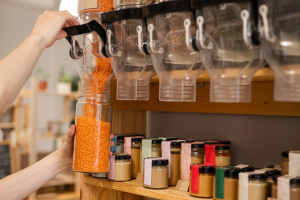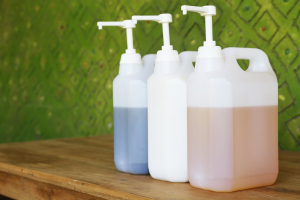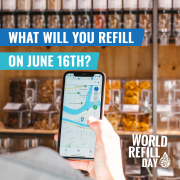Refill is the new Recycle
 I’ve always considered myself to be a bit of a greenie, I recycle after all! However, last month I took part in The Big Plastic Count organised by Greenpeace and Everyday Plastic. The aim was to count my plastic packaging waste over the course of a week and record it as part of a nationwide study to understand how much plastic waste we are creating in the UK.
I’ve always considered myself to be a bit of a greenie, I recycle after all! However, last month I took part in The Big Plastic Count organised by Greenpeace and Everyday Plastic. The aim was to count my plastic packaging waste over the course of a week and record it as part of a nationwide study to understand how much plastic waste we are creating in the UK.
We already know that we’re using too much plastic. The UK produces more plastic packaging per person than almost any other country in the world – only the US is worse. And if things carry on as they are, the amount of plastic waste produced around the world is set to double by 2040.
So could the answer to our plastic problems be refill?
The Plastic Problem
I live in a household of 3 and when shopping I try to look for products with the least amount of packaging e.g. buying loose fruit and veg. So, our family plastic footprint won’t be too bad right? Wrong! We consumed 60 pieces of plastic packaging over the week, over the year that’s the equivalent to 3,120 pieces a year. And if all households were the same as mine, the UK would use 87.6 billion bits of plastic every year!
87% of my plastic packaging waste was from food and drink. Most plastic packaging is single-use – designed to be used once and then thrown away. For a lot of people plastic packaging from food & drink will be highest. If supermarkets reduced the amount of fruit and vegetable wrapping, it would significantly cut plastic waste. Why do bananas need to be in plastic, they come in nature’s own packaging, right?
Refill is the new Recycle
 I have long thought that recycling is the answer. In West Sussex, kerbside collections have a recycling rate 53% (well above the national average of 44%). However, there are many types of plastics that can’t be recycled or can only be recycled once before they are no longer fit-for-purpose. Even products like plastic refill pouches have a finite life and are difficult to recycle. So, finding an alternative to using plastic is a better solution. Reducing our usage of plastic packaging means less waste and no packaging at all is the ultimate goal (just ask the bananas). But if this isn’t possible, why not try refilling old containers?
I have long thought that recycling is the answer. In West Sussex, kerbside collections have a recycling rate 53% (well above the national average of 44%). However, there are many types of plastics that can’t be recycled or can only be recycled once before they are no longer fit-for-purpose. Even products like plastic refill pouches have a finite life and are difficult to recycle. So, finding an alternative to using plastic is a better solution. Reducing our usage of plastic packaging means less waste and no packaging at all is the ultimate goal (just ask the bananas). But if this isn’t possible, why not try refilling old containers?
Refill can be Cheaper
 Buying a refill instead of a complete product saves 70% Co2, 65% energy and 45% water. Shopping in this way doesn’t need to be more expensive either. It’s worth shopping around, for example, our Sussex Green Hub, offers a refill service of personal care and household cleaning products. A bottle of Faith In Nature Shampoo 400ml costs £2.25 to refill vs £5.50 – £6.50 to buy new in the supermarkets.
Buying a refill instead of a complete product saves 70% Co2, 65% energy and 45% water. Shopping in this way doesn’t need to be more expensive either. It’s worth shopping around, for example, our Sussex Green Hub, offers a refill service of personal care and household cleaning products. A bottle of Faith In Nature Shampoo 400ml costs £2.25 to refill vs £5.50 – £6.50 to buy new in the supermarkets.
So let’s start a refill revolution. Here are some tips for getting started:
- Start small. Make just one or two changes at a time and build up bit by bit.
- Go collapsible. Invest in a collapsible water bottle or coffee cup, they’re easier to fit in your bag and you’re less likely to forget them.
- Use a refill service. More and more refill shops are popping up in Sussex.
- Go naked. Choose unwrapped options when shopping for fruit and veg.
- Plan ahead. It may take some planning as using refills often means buying in bulk…but there are savings to be had.
 Thursday 16th June is World Refill Day – the perfect opportunity to put some of these tips into action, and encourage your friends and family to join you. Refill have an App so you can search nearby places to refill your water bottle, coffee cup or find a plastic-free shop.
Thursday 16th June is World Refill Day – the perfect opportunity to put some of these tips into action, and encourage your friends and family to join you. Refill have an App so you can search nearby places to refill your water bottle, coffee cup or find a plastic-free shop.
We have compiled a list of refill shops in the Horsham area HERE, so take a look and see if you can join the refill revolution!


